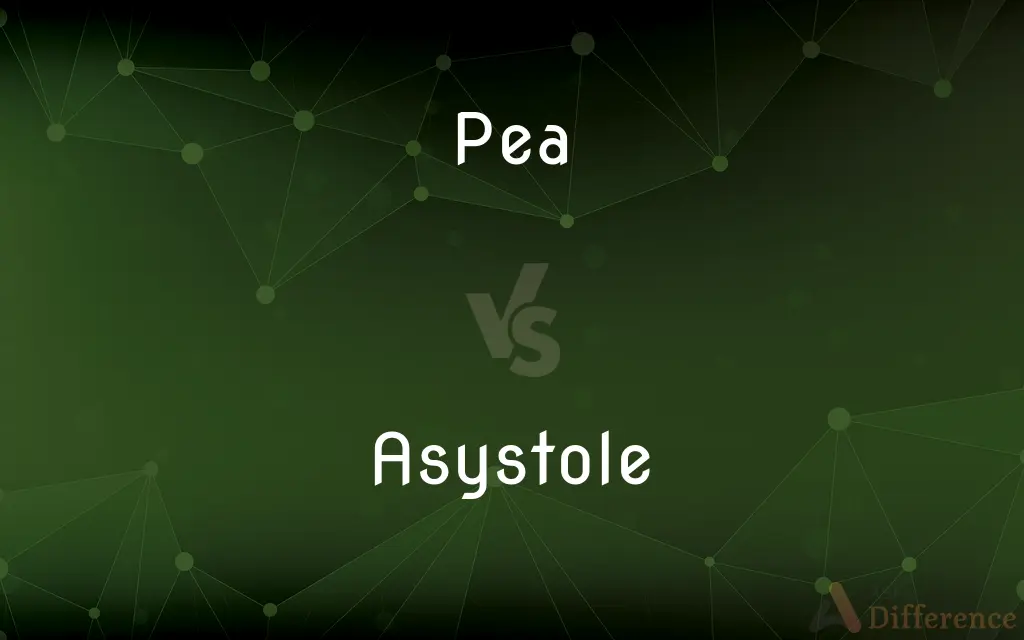PEA vs. Asystole — What's the Difference?

Difference Between PEA and Asystole
ADVERTISEMENT
Compare with Definitions
Pea
The pea is most commonly the small spherical seed or the seed-pod of the pod fruit Pisum sativum. Each pod contains several peas, which can be green or yellow.
Asystole
Asystole is the absence of ventricular contractions in the context of a lethal heart arrhythmia (in contrast to an induced asystole on a cooled patient on a heart-lung machine and general anesthesia during surgery necessitating stopping the heart). Asystole is the most serious form of cardiac arrest and is usually irreversible.
Pea
A member of the pea family.
Asystole
A condition in which the heart ceases to beat.
Pea
A widely cultivated climbing annual vine (Pisum sativum) native to Eurasia, having compound leaves with terminal leaflets modified into tendrils and globose, edible seeds enclosed in a green, elongated pod.
ADVERTISEMENT
Asystole
Absence of systole; failure of the heart to contract.
Pea
The pod of this plant
Picked peas for dinner.
Asystole
A weakening or cessation of the contractile power of the heart.
Pea
The seed of this plant, used as a vegetable.
Asystole
Absence of systole; failure of the ventricles of the heart to contract (usually caused by ventricular fibrillation) with consequent absence of the heart beat leading to oxygen lack and eventually to death
Pea
A similar seed of various other plants, such as a cowpea.
Pea
Any of several plants of the genus Lathyrus, such as the sweet pea or the beach pea.
Pea
A plant, Pisum sativum, member of the legume (Fabaceae) family.
Pea
Any plant of the family Fabaceae.
Pea
(culinary) The edible seed of Pisum sativum; the green pea.
Pea
(culinary) The edible seed of various other pea plants.
Pea
(Jamaica) Any of several varieties of bean.
Peas and rice
Pea
Money.
Man's making bare peas.
Pea
(baseball) A ball travelling at high velocity.
Pea
Any of the small numbered balls used in a pea shake game.
Pea
(galaxy) green pea galaxy
Pea
A peafowl
Pea
The sliding weight on a steelyard.
Pea
A plant, and its fruit, of the genus Pisum, of many varieties, much cultivated for food. It has a papilionaceous flower, and the pericarp is a legume, popularly called a pod.
Pea
A name given, especially in the Southern States, to the seed of several leguminous plants (species of Dolichos, Cicer, Abrus, etc.) esp. those having a scar (hilum) of a different color from the rest of the seed.
Pea
Seed of a pea plant
Pea
The fruit or seed of a pea plant
Pea
A leguminous plant of the genus Pisum with small white flowers and long green pods containing edible green seeds
Share Your Discovery

Previous Comparison
Dialect vs. Variety
Next Comparison
Casket vs. Basket














































